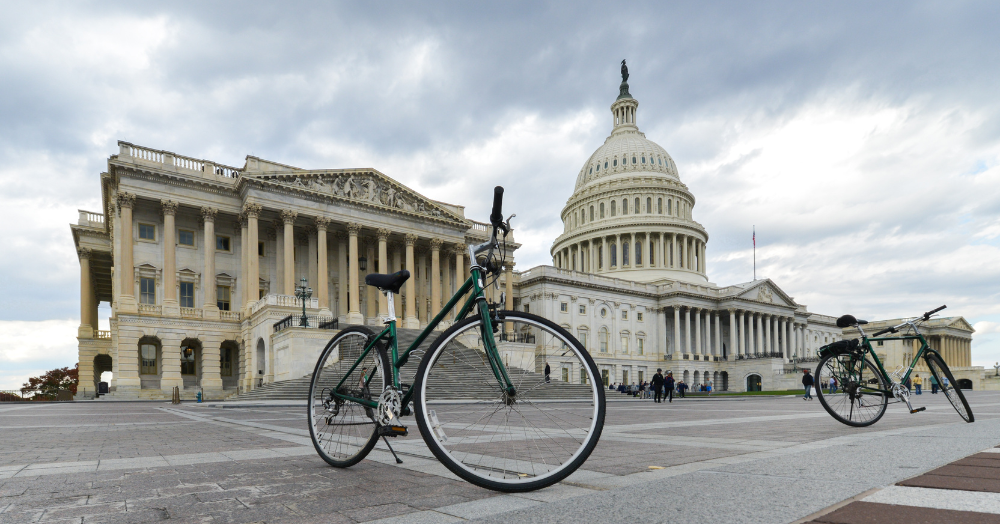In January 2025, the Association for Commuter Transportation (ACT) unveiled its set of comprehensive recommendations for expanding commuter tax benefits. Hoping to impact the incoming federal administration, ACT timed its presentation to align closely with the 2025 presidential inauguration.
RideAmigos supports ACT’s advocacy on this issue—several of our team members were part of ACT’s Commuter Tax Benefits Work Group and Public Policy Committee task force. In recognition of their efforts, and to help educate TDM stakeholders on where commuter tax benefits might be headed, we’ve put together this summary of the ACT task force’s policy recommendations.
Background: Understanding ACT and its role
Headquartered in Sharon, Massachusetts, ACT is the leading national organization advocating for commuter transport and transportation demand management (TDM) policy. Engaging and empowering stakeholder organizations and TDM professionals, ACT works to advance its vision of “a better journey for everyone” by:
- Advocating for efficient and accessible multimodal transportation networks;
- Improving life for commuters by building more sustainable transportation options;
- Stimulating economic activity through the targeted development of TDM programs; and
- Making communities cleaner and more liveable.
Learn more about ACT, its mission, and its vision.
Key ACT commuter tax benefits recommendations
Here’s a high-level review of the key commuter tax benefits recommendation ACT plans to propose to the incoming federal administration:
TDM and modal recommendations
During its commuter tax benefits policy development process, ACT’s task force divided into four subgroups. Each subgroup focused on a particular transportation mode or TDM niche, proposing changes intended to alleviate issues specific to that niche.
Here’s an at-a-glance breakdown of each subgroup’s proposed recommendations, and their potential impacts:
| Subgroup | Recommendation(s) | Potential Impact(s) |
| Transit | Eliminate restrictions on cash reimbursements in places where terminal-restricted debit cards and transit vouchers are widely available | Would make it easier for transit passengers who pay for fares with their own bank cards to receive reimbursement benefits |
| Vanpooling and carpooling | Create new commuter tax benefits specifically for carpooling Adjust the occupancy requirements vanpools must meet to qualify for commuter tax benefits | Stimulate higher levels of voluntary carpool participation Adjust tax policy to recognize higher rates of hybrid workplace participation in the post-pandemic environment Empower employers to continue operating tax-advantaged vanpool services |
| Bicycling and micromobility | Replace the existing cycling reimbursement with a streamlined micromobility tax benefit | Would expand commuter tax benefits beyond cycling to include bikeshares and scooters/e-scooters |
| Parking | Eliminate parking benefits for locations at or near the employer’s place of business Add parking benefits at mobility hubs where commuters can complete their journeys using public transit, carpools, or vanpools | Would disincentivize solo driving to urban destinations where employers subsidize parking or finance parking costs with pre-tax savings Would create a strong incentive for commuters to adopt more sustainable modes for at least part of their daily journey |
The ACT task force and its subgroups also considered additional, more general policy recommendations. One idea that drew widespread support was a proposal to eliminate restrictions on certain classes of employees, who are currently ineligible to receive commuter tax benefits. These employee classes include:
- Self-employed individuals and contractors;
- Partners in a corporation;
- 2% shareholders of S corporations.
These individuals combine to account for approximately 10% of the U.S. labor force. In ACT’s view, they should become eligible for tax benefits when they commute.
Updating Section 132(f) of the Internal Revenue Code
ACT also proposed multiple changes and updates to Section 132(f) of the Internal Revenue Code, which deals directly with commuter tax benefits. Specific suggestions include:
Redefining “qualified transportation fringe benefits”
Section 132(f) currently recognizes four classes of transportation fringe benefits: commuter highway vehicles (i.e. passenger automobiles), public transit, parking, and bicycling.
ACT proposes eliminating the bicycling category and replacing it with “micromobility,” which would recognize cycling along with other personal transportation modes like scooters and e-scooters. In addition, ACT proposes adding a fifth eligibility category to extend benefits to carpooling.
Expanding transportation fringe benefit exclusions on gross (taxable) income
Under current Internal Revenue Code standards, employees may exclude fringe benefits up to a monthly and annual limit from their gross income. That monthly allowance may only be applied toward the use of commuter highway vehicles and public transit.
ACT advocates for expanding eligibility for fringe commuter tax benefits to include both carpooling and micromobility. In ACT’s view, this would provide a direct financial incentive for commuters to make more frequent use of these helpful alternatives to solo driving.
How you can help advance ACT’s commuter tax benefits policy proposals
ACT formally unveiled its commuter tax benefits policy proposal during a webinar held on January 28, 2025. As a starting point, we encourage you to check out ACT’s website for complete context and comprehensive discussions about the policy recommendations, as well as information about ways to support these important benefits.
You can get involved by:
- Using social media and other online outreach channels to engage and educate your following on commuter tax benefits and the role they play in building more sustainable transportation habits;
- Conducting research or using case studies to generate data on the impact potential of policy change within your organization, and forwarding that information to stakeholders in government;
- Creating a petition or sign-on letter endorsing ACT’s commuter tax benefits proposal and submitting it to elected representatives. ACT provided useful templates and instructions for contacting your representatives here.
ACT’s webinar also included a robust discussion on additional strategies you can use to advance the organization’s commuter tax benefits proposal. Follow our blog for more updates when available and stay engaged with what we’re working on.





